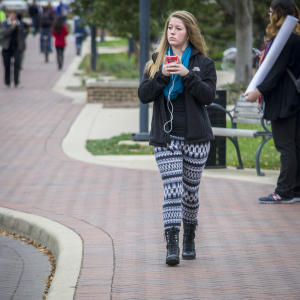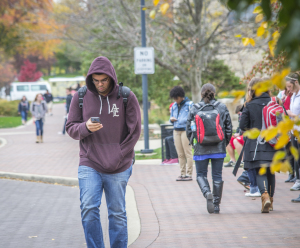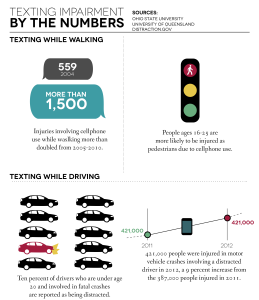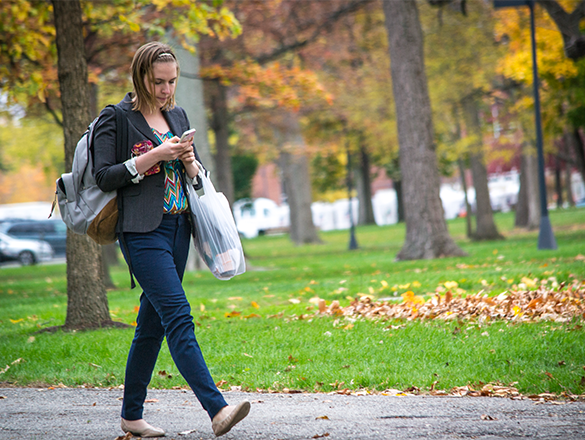
Walking around campus with their heads bent, students tap away on their phones. They are nearly bumping into people or poles, strolling off the sidewalk or into the road. You’ve seen one or been one: a distracted walker.
However, some students would not consider themselves at risk.
“It never [hurt me] before but I guess it could if I’m not paying attention,” said student Claire Cowan. “I’m not usually in a hurry, but I probably don’t walk as fast when I’m texting because I’m concentrating on something else.”
Cowan said because she hasn’t been in any mishap, it is not an issue for her.
But texting while walking has been proven to be a danger to pedestrians.
A recent study by Ohio State University shows injuries involving cellphone use while walking more than doubled between 2005 and 2010. People ages 16 to 25 are most at risk for cellphone related injuries while walking.
Texting while walking averts the eyes from the surrounding world. But it also affects the full body.
Researchers at the University of Queensland in Australia found that texting while walking significantly altered a person’s body motion and posture.
Those texting while walking began to walk rigidly with stiff neck and back movements, took shorter steps, slowed down and deviated away from a straight line. They had a harder time keeping balance and didn’t pay as much attention to surroundings.
The myth of multitasking is a huge contributor to the walking while texting phenomenon, said Ball State psychology professor Kerri Pickel.
“The bigger issue is what your brain is doing not really where your eyes are,” Pickel said.
She compares available attention span to a water tank. There’s only so much water available and every time people try to complete a task they must take water out of the tank. As they suddenly add more responsibilities, simultaneously the resources become depleted much faster. The harder a task is, the more mentally exhausting it is.

A Stanford University study found that those who multitask a lot and believe it betters their performance do worse than those who do one thing at a time. Heavy multitaskers have a harder time forming their thoughts while switching from one activity to another.
“Being in a conversation with someone, talking on the phone or texting is actually pretty challenging, unless the conversation is extremely superficial,” Pickel said.
“It takes mental effort to actually have a conversation with someone.”
Students on cellphones aren’t a rare sight on college campuses, but the problems associated with the distractions aren’t always recognized.
It’s also possible that there are long-term consequences to multitasking. Researchers from the University of Sussex have detected differences in the area of the brain responsible for cognitive and emotional control. It is not currently clear if these changes to the brain chemistry are a direct result of multitasking or the result of existing brain damage.

Sources: Ohio State University, University of Queensland, Distraction.gov
“It at least raises the possibility that people are changing their brains for the worse by doing all this multitasking,” Pickel said.
When walking, it seems challenging to put down a phone and pay attention to your surroundings. But what it will take for that to happen is another question yet to be answered.
“It seems like education is a good first step. If people don’t even know about this why would they change their behavior?” Pickel said.
“But that’s not enough. It seems like we need something else to convince people but I don’t know what that is.”




